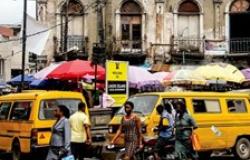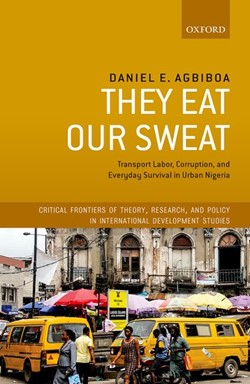Book Review - They Eat Our Sweat: Transport Labor, Corruption, and Everyday Survival in Urban Nigeria

They Eat Our Sweat: Transport Labor, Corruption, and Everyday Survival in Urban Nigeria by Daniel E Agbiboa. Oxford: Oxford University Press 2022. £75 hardcover 9780198861546
Daniel E. Agbiboa’s book explores the world of drivers of minibuses (danfo) and motorcycles (okada) in Lagos, the economic capital of Nigeria. It describes the everyday interactions between them, their conductors, the union members regulating the garages through which they pass daily, and police officers. It is a view from the grassroots, through a long-time ethnographic observation. During his PhD, Agbiboa worked as a conductor plying different routes in Lagos providing invaluable descriptions and, on the road, a mobile ethnography completed by observation in major places of transport (garages, junctions, checkpoints) in two densely populated areas of Lagos. The book includes hundreds of interviews with drivers, conductors, agbero (illegal tax collectors working for the major transport union), a more limited number of police agents and the visual materials of more than three hundred slogans depicted on the minibuses. With a so strong an empirical basis, the book comes at a very good time. More transport specialists have recently and empirically explored grounded analysis to illuminate the multifaceted nature of mobility systems in Africa. Agbiboa’s book is located at the crossroads of this emerging literature on transport, and a more established anthropological understanding on corruption and street level bureaucracy, as well as urban studies literature. The author invites us to think of Lagos and Nigeria outside its own specific urban environment while being very detailed about the hardship endured by transport workers in Lagos.
 The book is very sensitive to the domination taking place in the transport sector, far away from a literature valorizing informality in Africa. It clearly exposes and details the daily interactions between drivers, police officers and members of the dominating union in Lagos, the National Union of Road Transport Workers (NURTW). Corruption is a key object around which much of the book revolves. The first three chapters provide a critical analysis of corruption, looking at its various and competing meanings and its place in the regular functioning of the state in Nigeria. Agbiboa is careful to not essentialize corruption, but instead describes periods of acceleration of corrupt practices and moments of anti-corruption initiatives. While being very careful in showing the difficulty to extricate corruption from other social behaviors, the study clearly reveals the micro dynamics of corruption on the road transport sector in Lagos. The core empirical chapters (Chapters 3-6) look at the interplay between the intense, dangerous, and precarious labor of the drivers and their obligation to pay fees, dues and what is referred to as extortion and bribes imposed by street level bureaucrats from the union and different police bodies. As so eloquently mentioned by one danfo driver “I work tirelessly each day, while the ‘baboons’ (touts and police) stand in the roundabout and just chop (eat) my sweat”.
The book is very sensitive to the domination taking place in the transport sector, far away from a literature valorizing informality in Africa. It clearly exposes and details the daily interactions between drivers, police officers and members of the dominating union in Lagos, the National Union of Road Transport Workers (NURTW). Corruption is a key object around which much of the book revolves. The first three chapters provide a critical analysis of corruption, looking at its various and competing meanings and its place in the regular functioning of the state in Nigeria. Agbiboa is careful to not essentialize corruption, but instead describes periods of acceleration of corrupt practices and moments of anti-corruption initiatives. While being very careful in showing the difficulty to extricate corruption from other social behaviors, the study clearly reveals the micro dynamics of corruption on the road transport sector in Lagos. The core empirical chapters (Chapters 3-6) look at the interplay between the intense, dangerous, and precarious labor of the drivers and their obligation to pay fees, dues and what is referred to as extortion and bribes imposed by street level bureaucrats from the union and different police bodies. As so eloquently mentioned by one danfo driver “I work tirelessly each day, while the ‘baboons’ (touts and police) stand in the roundabout and just chop (eat) my sweat”.
Some fascinating parts of the book explore the everyday tactics used by drivers to escape such a harsh domination. Agbiboa makes incredible use of the material dimension of the multiple slogans inscribed on the danfos. Vehicle slogans as mimesis of everyday life. They provide a sense of hope and despair, hardship and dreams, expectations and frustrations. Although drivers generally stick to the official requirements of yellow and black paint by Lagos state government, transport painters carve out an identity for themselves within the interstitial spaces of the legislation. This ‘art of the weak’ is very apparent in the tactics of drivers to try to maximize profits in driving different minibuses: some drivers try to escape the multiple extortion on the road; some have the potential to make more money than taxi owners, themselves interrogating the frontier between capitalists and workers in this business. The book is also able to disentangle different operators within the garages. The distinction between agberos who are identified with a specific garage and area boys (local boys tied to a particular neighborhood) is most welcome, as the two categories are too often confused within and outside Nigeria. Agbero when their voices are reported do not want to be associated with the criminal word: they think of themselves as workers. The mobilization of Okada riders against the attempt of the Lagos state government to ban them from operating in most of the city is excellent. In a context in which motorbike drivers are increasingly associated with crime, danger and disorder, the Lagos government banned in 2012 the use of Okada motorcycles in the most important roads of the state and wealthy neighborhoods, in order to promote Lagos as a ‘world class city’. The book’s account of both the making of the law, and the mobilization of the drivers in the name of the constitution, the right to work and access to the city is impressive in this context.
The part on the transport mafia has strengths and limits. As rightly mentioned by Agbiboa, unions are not necessarily conducive to democratization processes and might reproduce unaccountable modes of governance. In the book the NURTW is clearly the predatory organization. The union has become powerful in regulating transport while playing a key role in electoral politics in Nigeria. The author shows that the unionization of agberos had the twin effects of politicizing and expanding their role in urban transport (p. 147). Their collections of illegal dues among drivers shows how much the former contribute to the precarious life of the later. What is less clear is to what extent the daily encounters between agberos, drivers, and police agents are marked by extortion and complicity as he suggests (p. 148). The complicity clearly appears between agberos and police agents, never between agbero and drivers. To some extent, the book is the drivers’ vision, more than union members, whose voices are rarely heard.
Drivers insist that agberos are making easy money from their work. The author also concludes that there is a predatory union-state alliance that criminalizes the hard work and ‘eats the sweat of drivers’ (p. 208). This view has a strong merit and needs to be explained in a context in which the exploitation of non-unionized drivers is so harsh. But it does not help to enter the political dynamics and the tensions existing within the union itself and the ambivalent relationships developed between the union and other institutions (local government, state government, police, military). Agbero are actually often in the same precarious conditions as transport workers themselves: they are the subalterns within the union whose leaders impose on them a revenue target fixed every day. Many of them hardly make a living from their work. As agbero and drivers work together daily, one should ask whether there are no forms of sociability and complicity between them? Are their relationships only shaped by exploitation? Eventually, the relationships of the union with politicians, bureaucrats, and police officers are made of multiple precarious and more or less stable arrangements. Like many other groups in Nigeria, union members are also in conflict with police officers: they try to protect their drivers against the illegal extortion of the street level police officers in order to protect the business of their own garages.
These remarks on the union, however, do not change the overall quality of the work. In focusing on the politics of road transport, on the everyday corruption and the hard-living world of transport drivers, Agbiboa’s book constitutes the most detailed and accurate account existing on the road transport system in Nigeria so far.
Laurent Fourchard is a research fellow in the Centre for International Studies, at Sciences Po, Paris.


